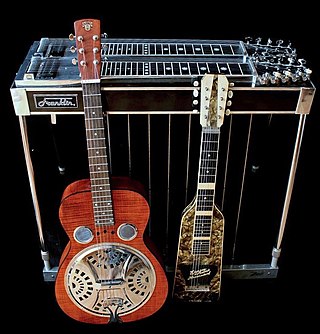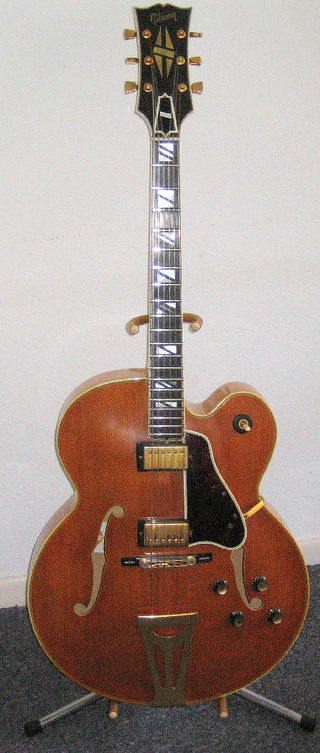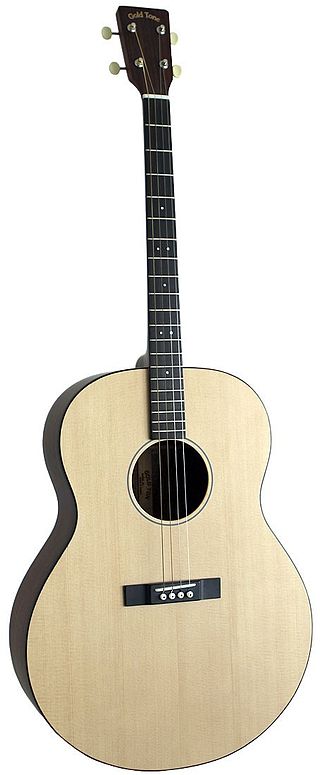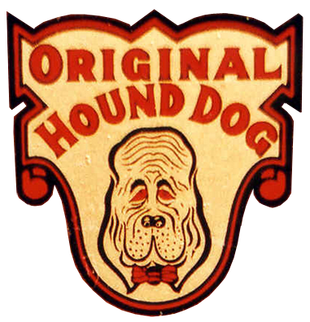
An electric guitar is a guitar that requires external electric sound amplification in order to be heard at typical performance volumes, unlike a standard acoustic guitar. It uses one or more pickups to convert the vibration of its strings into electrical signals, which ultimately are reproduced as sound by loudspeakers. The sound is sometimes shaped or electronically altered to achieve different timbres or tonal qualities via amplifier settings or knobs on the guitar. Often, this is done through the use of effects such as reverb, distortion and "overdrive"; the latter is considered to be a key element of electric blues guitar music and jazz, rock and heavy metal guitar playing. Designs also exist combining attributes of electric and acoustic guitars: the semi-acoustic and acoustic-electric guitars.

Rickenbacker International Corporation is a string instrument manufacturer based in Santa Ana, California. Rickenbacker is the first known maker of electric guitars, with a steel guitar in 1932, and produces a range of electric guitars and basses.

A steel guitar is any guitar played while moving a steel bar or similar hard object against plucked strings. The bar itself is called a "steel" and is the source of the name "steel guitar". The instrument differs from a conventional guitar in that it is played without using frets; conceptually, it is somewhat akin to playing a guitar with one finger. Known for its portamento capabilities, gliding smoothly over every pitch between notes, the instrument can produce a sinuous crying sound and deep vibrato emulating the human singing voice. Typically, the strings are plucked by the fingers of the dominant hand, while the steel tone bar is pressed lightly against the strings and moved by the opposite hand.

The pedal steel guitar is a console-type of steel guitar with pedals and knee levers that change the pitch of certain strings to enable playing more varied and complex music than other steel guitar designs. Like all steel guitars, it can play unlimited glissandi and deep vibrati—characteristics it shares with the human voice. Pedal steel is most commonly associated with Country music and Hawaiian music.

A single coil pickup is a type of magnetic transducer, or pickup, for the electric guitar and the electric bass. It electromagnetically converts the vibration of the strings to an electric signal. Single coil pickups are one of the two most popular designs, along with dual-coil or "humbucking" pickups.

An archtop guitar is a hollow acoustic or semi-acoustic guitar with a full body and a distinctive arched top, whose sound is particularly popular with jazz, blues, and rockabilly players.

The tenor guitar or four-string guitar is a slightly smaller, four-string relative of the steel-string acoustic guitar or electric guitar. The instrument was initially developed in its acoustic form by Gibson and C.F. Martin so that players of the four-string tenor banjo could double on guitar.
Adolph Rickenbacker (April 1, 1887 – March 21, 1976) was a Swiss-American production engineer and machinist who, together with George Beauchamp, created the first electric string instrument, and co-founded the Rickenbacker guitar company, also with Beauchamp.
John Dopyera was a Slovak-American inventor and entrepreneur, and a maker of stringed instruments. His inventions include the resonator guitar and important contributions in the early development of the electric guitar.

A resonator guitar or resophonic guitar is an acoustic guitar that produces sound by conducting string vibrations through the bridge to one or more spun metal cones (resonators), instead of to the guitar's sounding board (top). Resonator guitars were originally designed to be louder than regular acoustic guitars, which were overwhelmed by horns and percussion instruments in dance orchestras. They became prized for their distinctive tone, and found life with bluegrass music and the blues well after electric amplification solved the problem of inadequate volume.

The National String Instrument Corporation was an American guitar company first formed to manufacture banjos and then the original resonator guitars. National also produced resonator ukuleles and resonator mandolins. The company merged with Dobro to form the "National Dobro Company", then becoming a brand of Valco until it closed in 1968.

The Regal Musical Instrument Company is a former US musical instruments company and current brand owned by Saga Musical Instruments. Regal was one of the largest manufacturers in the 1930s and became known for a wide range of resonator stringed instruments, including guitars, mandolins, and ukuleles. Only resonator guitars are sold under the Regal brand today, with manufacturing in Korea and distribution in San Francisco, United States.

Original is an American brand currently owned by Gibson through its subsidiary Epiphone. The company uses the brand to produce and commercialize resonator guitars.

The Rickenbacker Electro A-22, nicknamed the "Frying Pan" is the first electric lap steel guitar, also widely considered the first commercially successful electric guitar. Developed in 1931/1932, it received its patent in August 1937. A previous attempt, the Stromberg company‘s transducer-based "Stromberg Electro", was introduced in 1928. It used a "vibration-transfer rod" from the instrument's sounding board attached to magnets inside the guitar, and was not successful. George Beauchamp created the "Fry-Pan" in 1931, and it was subsequently manufactured by Electro String Instrument Corporation under the name Electro, later named Rickenbacker. The instrument gained its nickname because its circular body and long neck make it resemble a frying pan.
Electric guitar design is a type of industrial design where the looks and efficiency of the shape as well as the acoustical aspects of the guitar are important factors. In the past many guitars have been designed with various odd shapes as well as very practical and convenient solutions to improve the usability of the object.
Valco was a US manufacturer of guitar amplifiers from the 1940s through 1968.
A resonator ukulele or "resophonic ukulele" is a ukulele whose sound is produced by one or more spun aluminum cones (resonators) instead of the wooden soundboard. These instruments are sometimes referred to as "Dobro ukuleles," however the term "Dobro" is currently trademarked by the Gibson Guitar Corporation.

A resonator mandolin or "resophonic mandolin" is a mandolin whose sound is produced by one or more metal cones (resonators) instead of the customary wooden soundboard. These instruments are sometimes referred to as "Dobro mandolins," after pioneering instruments designed and produced by the Dopyera Brothers, which evolved into a brand name. The trademark "Dobro" is currently the property of the Gibson Guitar Corporation. When Gibson acquired the trademark in 1993, they announced that they would defend their right to its exclusive use.
A phonofiddle is a class of stringed musical instruments that are played with a bow and use a phonograph type reproducer as a voice-box.















